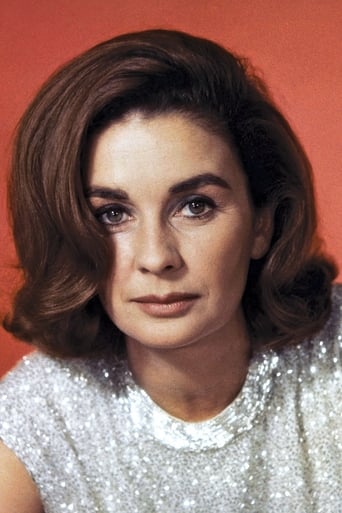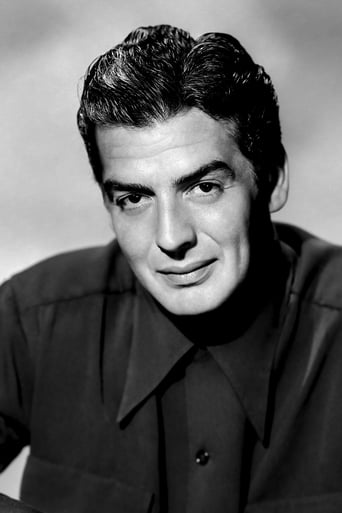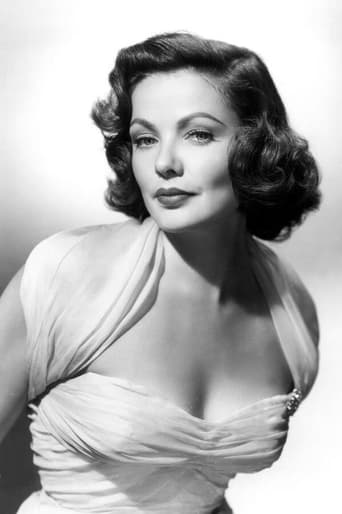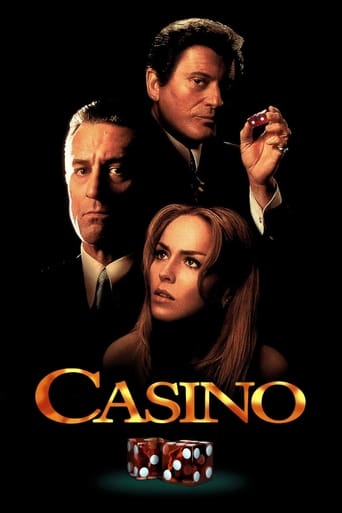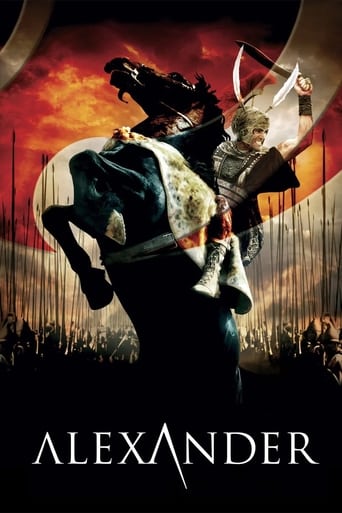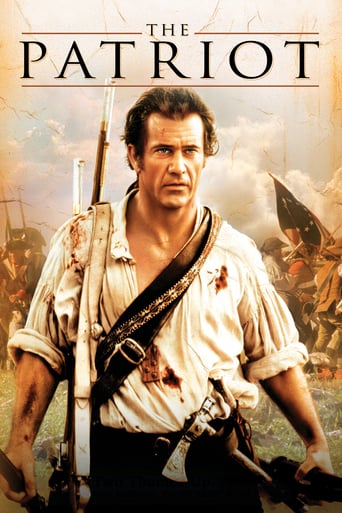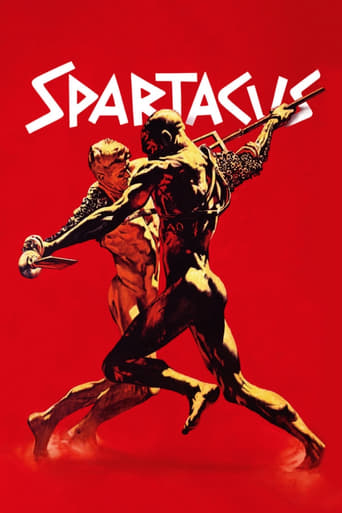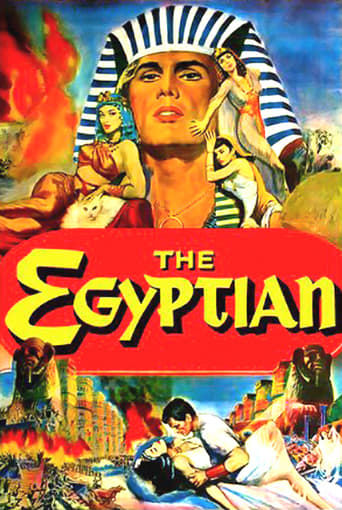
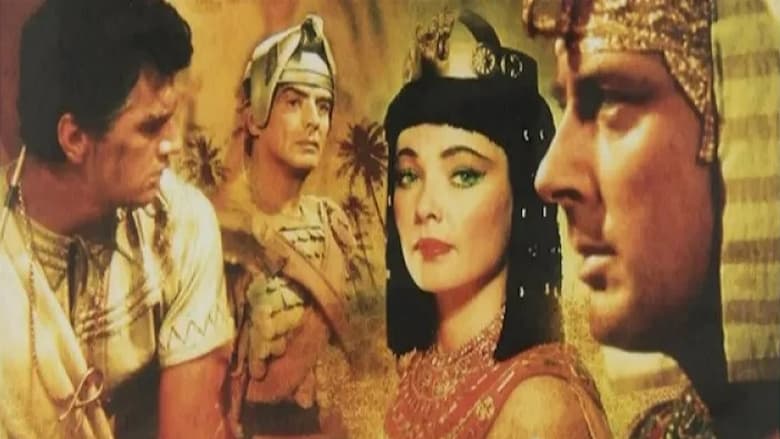
The Egyptian (1954)
In eighteenth-dynasty Egypt, Sinuhe, a poor orphan, becomes a brilliant physician and with his friend Horemheb is appointed to the service of the new Pharoah. Sinuhe's personal triumphs and tragedies are played against the larger canvas of the turbulent events of the 18th dynasty. As Sinuhe is drawn into court intrigues he learns the answers to the questions he has sought since his birth.
Watch Trailer
Cast
Similar titles

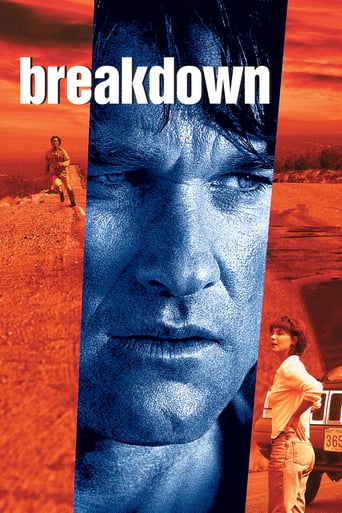

Reviews
Good movie but grossly overrated
best movie i've ever seen.
A terrific literary drama and character piece that shows how the process of creating art can be seen differently by those doing it and those looking at it from the outside.
All of these films share one commonality, that being a kind of emotional center that humanizes a cast of monsters.
inspired adaptation of Mika Waltari novel. or only part of a series of historical films. in fact, a beautiful film who escapes from the rules of the genre or fashion of a period. because it is a good exam of the small significant values. and nice way for use great actors in a story about the truth, honor and courage. a film about faith. and hope. so, it is unfair to define it. the only right choice - see it. twice. for a powerful message and for the wise manner to remind old basic truths. story of a hero across the challenges. and his victory. or lesson. about the inner force who defines each from us.
First of all, this is a typical 1950s saga of adventure, intrigue, and love in an exotic place. I admit to having a hard time believing this is Ancient Egypt though. Where are all the cats? Only one is to be seen except a lion (promptly killed by the heroic Victor Mature.). Those cats were sacred. People adopted make up that imitated them. Tens of thousands were mummified. And why not? The Egyptians thought they were great in killing the rats and mice that nibbled at the hordes of stored grain. But then the prop department at least got the mirrors right -- polished brass for the aristos. What must it have been like for the masses, not to know what they looked like except from the expressions of others? I'd like you to know that I speak to you as an expert, having once successfully located Egypt on a map of Europe in the fifth grade.This movie was shredded when it appeared, largely because of the ligneous performance of the star, Edmund Purdum, but I don't know that he's better or worse than, Kerwin Mathews, say, or any others of that ilk. There's a well-known supporting cast -- the incestuous Gene Tierney, the treacherous Bella Darvi (Zanuck's main squeeze), the heinous Tommy Rettig, the serene and pretty Jean Simmons, the bald Henry Daniell, the moose-like Victor Mature, and probably the most likable performer Peter Ustinov as a humble but sagacious slave.You might not know it from all the traveling around and the intrigues and the love stories but the central figure in the narrative is Michael Wilding's pharaoh, here named Akhnaton, earlier Amenhotep or something. These names are confusing and hard to spell. In any case, Wilding's figure is an important one. His wife was Nefertiti and he himself may have fathered King Tut. Now, Nefertiti might have been an attractive woman, judging from a bust of her that shows up in popular venues from time to time, but Akhnaton didn't look like Michael Wilding. His statues show a smiling figure with a serpentine twist and a full pelvic girdles, almost feminine. After he death, many of his icons were mutilated and written references chopped out, and here's why.Egypt at the time, say 1350 BCE, worshiped an awful lot of gods representing hordes of real objects and fantasies. Akhnaton developed the idea that there was basically one god who ruled the others, the sun, called Aten, under which Egypt lived day after day unfailingly. This was the introduction of monotheism into the Middle East. It's not surprising that One Big God should come out of the mixed mythologies of the area, like Judaism, Christianity, and Islam. They all lived under One Big Sun, which probably inspired the idea. No Big God has come slouching out of the jungle.However, it didn't go over too well with the devotees of the other gods. Aknaton and his religion became even more oppressive when he began preaching peace and tolerance, when the Egyptians were accustomed to war with everybody around them. Akhnaton neglected his foreign territories and promoted internal reforms and oversaw the development of arts and sciences instead. Atenism was a violation of traditional religion and after Akhnaton's death -- poisoned by Purdum in this story -- the new religion failed and Akhnaton was seen as a traitor and his monuments defaced. Akhnaton simply overreached. Culture is a patterned thing, everything is woven together with everything else. It's not an easy thing to tear a hole in it and try to patch in some alien content.He is, nevertheless, the central figure, despite Wilding's limited screen time, because this is the story of the bellwether of modern world religions. Hinduism and Buddhism don't have One Big God. It rains too much in India.And what of Edmund Purdom, his youthful foolishness and his gradual maturation? Well, he rises in Egypt from nothing to become a famous physician. It's hard to imagine. At one point he diagnoses what appears to be a brain tumor by pressing the patient's forehead and decides to open the guy's skull. But then they did have laudanum and anyone willing to hand out an opiate is liable to become famous. And some of their instruments look almost exactly like our own, the curette for instance. The form is hard to improve upon. I mean, how would you improve on a perfect modern tool like a hammer? Meanwhile Purdom rises to prominence, then falls, then travels, then re-rises to prominence and ends up bereft of his lover but filled with faith, a kind of John the Baptist of the era.The movie itself is sluggish, with no humor except that provided by Ustinov's lying servant. The two of them move from kingdom to kingdom while geological epochs seem to pass. Yet it's a fulsome rig, with pastel curtains in the breeze, pageantry, elaborate costumes, and a stilted but still legible script. You won't see any great wars or miracles. People of faith move around and talk. It's not a total failure, and a post script at the end points out the importance of Akhnaten's position in history. You might like it.
The cast is excellent, with Michael Wilding presenting the most convincing performance as the Pharaoh Ekhnaton in the difficult dilemma of being 13 centuries before his time, which actually was historically correct. All the rest is fantasy, although mummies were made indeed and most indefatigably in Egypt for three millennia, it was their prominent speciality, by the help of opening the brain in a kind of prehistoric brain surgery. The protagonist's father excels in this medical art and passes it on to his son, who makes his fortune at the court of Pharaoh, who occasionally suffers from headaches and epileptic fits, so he needs his brain physician. Victor Mature plays Sinuhe's best friend, the more pragmatic and less altruistic coming leader of the future in battles and slaughters, called Horemheb, while Gene Tierney also makes a credible and politically more realistic sister to a Pharaoh only good for sun- and star-gazing. Bella Darvi plays another important part as the ruin of the hero physician, who makes a total mess of his so promising career by reckless passion. Peter Ustinov saves him time and time again only to lose him in the end. Finally there is Jean Simmons, the real heroine of the tale and the only actual martyr among them all, who represents all that they should be living for, presenting that meaning of life that Sinuhe so eagerly quests for, which he ignores as the stupid fool he is. The music of Bernard Herrmann and Alfred Neuman is also apt and perfect all the way like the splendid photography and Michael Curtiz' direction, - so what then is so wrong about this film?It's the story itself that is not at all convincing. All the weakness is found in Mika Waltari's novel, an interesting story by all means, but he understood nothing about Egypt. Another author who wrote novels of ancient Egypt was Joan Grant, whose versions are as almost palpably credible as Waltari's is more like science fiction. Not even the dialogue is good, although the film has improved it by cutting as much of the nonsense as possible. Still, some of the best episodes of the book are missing from the film, above all Sinuhe's adventures in Crete.It's a good film, nothing bad could be said about it, and we must try to forgive Mika Waltari's weakness for fantasizing in the manner of Edgar Rice Burroughs, Flash Gordon and Cecil B. DeMille rather than trying to actually recreate ancient Egypt. Ultimately, only Michael Wilding remains truly convincing.
As a die-hard fan of film pepla from the silent era through the golden age of widescreen epics of the 1950s and 1960s, I applauded the release several years ago, at last, by Twilight Time, of Michael Curtiz' The Egyptian (1954) on DVD and Bluray. The restoration is gorgeous, long overdue, and much appreciated. However, and I have been meaning to set this right for several years, the accompanying commentary track by film historians Alain Silver and James Ursini, both nominal specialists on the noir style, is often egregiously inaccurate, and was apparently not vetted at all by any editorial hand.First, the positives: it's true that the novel The Egyptian by Finnish writer Mika Waltari is one of the best of its kind, and that before he wrote it, Waltari had become famous in Finland as a popular and successful writer of noir-ish crime thrillers. The thread of noir in the film is astutely observed by Silver and Ursini, and as they say, resulted in a conflicted, isolated title character who was not the typical stuff of a heroic lead in a costume epic. This resulted in poorish box office and 20th Century Fox held back re- leases of the costly film, giving it its cult air. All that is true enough. And they comment sagely about the casting woes with Marlon Brando, who exited the film after day one of shooting, as well as the sad career trajectory of Bella Darvi and her involvement with the Zanucks (to Silver's and Ursini's credit, they praise her oft-derided performance as Nefer as striking just the right note of exotic detachment), and the excellent casting of Michael Wilding, Gene Tierney (more career and personal difficulties lay in her future at the time), the gorgeous production values, the 11th-hour casting of Edmund Purdom as Sinuhe, and the effectiveness of the classic score by Alfred Newman and Bernard Hermann. And about there, their combined credibility ceases, for all of that information is (and has been) readily known and available to any interested parties who can use a library or Google.Now, the negatives: For starters, they insist the film was a "sequel" to Fox's huge hit and first widescreen production, The Robe. No, the sequel to The Robe was Demetrius and The Gladiators. Period. For sure, The Egyptian was meant to jump on the widescreen bandwagon of quasi-religious, historical epics, but a sequel it was not. Especially since the events of The Egyptian take place millennia before the events of The Robe.They claim that Peter Ustinov's character of the lovable scoundrel servant Kaptah is a total invention of the screenwriters and that he never appears in the book. I have my well-worn edition (Putnam, 1949) of the book with me as I type, and Kaptah makes his first appearance on page 75. While still plunging ahead with their "sequel to The Robe" idee fixe, they cite the casting of Jean Simmons and Peter Ustinov as components of that plan by Fox, continually praising Ustinov's performance as Nero, apparently in The Robe. Really? Ustinov was Nero in MGM's 1951 mega hit Quo Vadis. The mad emperor of The Robe was Caligula, memorably played by Jay Robinson in that film as well as it's sequel, Demetrius and the Gladiators. Nero was not even in power during the events of The Robe. While discussing the (eventually) stalled career of Purdom, they omit any reference to his being cast as the title lead in MGM's widescreen epic entry of the following year, The Prodigal, as well as Mature's affinity for the role of Horemheb via not only his accomplishments as a tough guy action hero, the antithesis of Sinuhe, but his own spectacle credentials as well, viz. DeMille's 1949 biblical hit, Samson and Delilah. I am happy to observe that in the Wikipedia entries on both Mr. Silver and Mr. Ursini, The Egyptian is omitted from their list of credits as DVD commentators, for their work is unaccountably shoddy and poorly executed. Twilight Time: As the 3,000 run limited edition of The Egyptian was clearly a hit (all copies gone) don't you think it's time for another re-issue, and with a commentary track that is worthy of the film?
